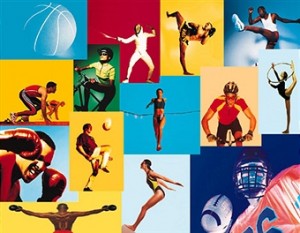 Optimal brain function should be a main concern to all aspiring athletes. The better a person's brain functions, the better the person functions overall! Neurofeedback assists in improving brain function, which in turn improves an athletes ability to perform at their best. Many professional athletes utilize neurofeedback to enhance their sports performance, including members of the US Olympic Ski Team, Olympic beach-volleyball player Kerri Walsh-Jennings, and members of the Italian soccer team. In fact, when Italy won the World Cup for soccer in 2006, members of their team described neurofeedback to be their secret weapon in performance ability and success. How exactly does neurofeedback affect a person's ability to play sports?
Optimal brain function should be a main concern to all aspiring athletes. The better a person's brain functions, the better the person functions overall! Neurofeedback assists in improving brain function, which in turn improves an athletes ability to perform at their best. Many professional athletes utilize neurofeedback to enhance their sports performance, including members of the US Olympic Ski Team, Olympic beach-volleyball player Kerri Walsh-Jennings, and members of the Italian soccer team. In fact, when Italy won the World Cup for soccer in 2006, members of their team described neurofeedback to be their secret weapon in performance ability and success. How exactly does neurofeedback affect a person's ability to play sports?
1. Attention and Focus
Sports performance places heavy demands on the brain to focus while simultaneously ignoring distracting stimuli. While different sports place different demands on the brain overall, neurofeedback improves a person's ability to stay on task while maintaining a high level of brain function.
2. Improves Emotional Control
Arguably one of the most difficult aspects of being an athlete is the ability to perform without being influenced by emotional triggers. Anxiety over a big upcoming game or the pressure to perform to high standards can negatively influence how an athlete performs. Neurofeedback stabilizes mood and emotional perception, including the perception and ability to cope with stress. This decreases anxiety overall, making moments of high demand easier to emotionally manage. Neurofeedback helps decrease distractibility caused by these emotions so an athlete can perform optimally.
3. Slows Cognitive Decline
As a person ages, the brain naturally begins to decline in certain areas, such as memory. Just as a person must exercise the body to keep in prime physical shape, fitness for the brain is also necessary to keep the brain functioning at its best. Neurofeedback acts as this exercise for the brain to maintain its highest ability. As an athlete ages, performance quality does not weaken as it naturally would, as the brain stays in peak condition.
4. Improves Sleep
A person's sleep directly influences how a person performs any task during the day, whether it be intellectual or physical performance. Athlete's need recuperative, restorative sleep to maintain brain health. Sleep also assists in the healing process, helping to keep the athlete in the best physical health possible. Neurofeedback has been proven to improve the quality and depth of sleep, which directly benefits an athlete's performance.
5. Restores Brain Function After Traumatic Brain Injury
Athletes suffer from traumatic brain injury due to the nature of sports. Brain injury can occur in one single incident or in less severe yet repetitive incidences, such as when a soccer player hits the ball with their head repeatedly after years of playing. Due to brain injury, difficulties arise in areas such as attention, emotional control, balance control, impulse control, anxiety, depression, insomnia, and even seizures. Neuroplasticity is the brain's natural ability to reorganize itself by creating new neural networks and correcting already existing connections. Thanks to neuroplasticity, neurofeedback is able to teach the brain to function normally once again, even if it has been many years since the initial injury.
Neurofeedback is safe for all ages. Each sport places different demands on the brain, so treatment protocol differs case to case. To learn more about what neurofeedback can do for your particular case, schedule a free consultation with Dr. Jolene Ross.








